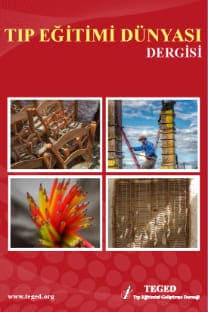Tıp Öğrencilerinin Online Sınavda Algıladıkları Stres Düzeyleri ve Stresle Başa Çıkma Yöntemleri
Tıp Fakültesi Öğrencileri, Çevrimiçi Sınav, Çevrimiçi Tıp Eğitimi, Algılanan Stress, Stresle Başa Çıkma Stilleri
Perceived Stress Levels of Medical Students and Methods of Coping with Stress at Online Exam
Medical Students, Online Exam, Online Medical Education, Perceived Stress, Styles of Coping with Stress,
___
- 1. Shah M, Hasan S, Malik S, Sreeramareddy CT. Perceived stress, sources and severity of stress among medical undergraduates in a Pakistani medical school. BMC Med Educ. 2010 Jan 15;10:2. doi: 10.1186/1472-6920-10-2.
- 2. Silva E, Aguiar J, Reis LP, Sá JOE, Gonçalves J, Carvalho V. Stress among Portuguese medical students: the eustress solution. J Med Syst. 2020 Jan 2;44(2):45. doi: 10.1007/s10916-019-1520-1. 3. Preston R, Gratani M, Owens K, Roche P, Zimanyi M, Malau-Aduli B. Exploring the impact of assessment on medical students’ learning. Assessment & Evaluation in Higher Education, 2020; 45(1): 109-124. doi: 10.1080/02602938.2019.1614145
- 4. Ahmed H, Allaf M, Elghazaly H. COVID-19 and medical education. Lancet Infect Dis. 2020 Jul;20(7):777-778. doi: 10.1016/S1473-3099(20)30226-7
- 5. Rajab MH, Gazal AM, Alkattan K. Challenges to online medical education during the COVID-19 pandemic. Cureus. 2020 Jul 2;12(7):e8966. doi: 10.7759/cureus.8966.
- 6. Elzainy A, El Sadik A, Al Abdulmonem W. Experience of e-learning and online assessment during the COVID-19 pandemic at the College of Medicine, Qassim University. J Taibah Univ Med Sci. 2020 Dec;15(6):456-462. doi: 10.1016/j.jtumed.2020.09.005.
- 7. Dennick R, Wilkinson S, Purcell N. Online eAssessment: AMEE guide no. 39. Med Teach. 2009;31: 3: 192-206, doi: 10.1080/01421590902792406.
- 8. Ellaway R, Masters K. AMEE Guide 32: e-learning in medical education part 1: learning, teaching and assessment. Med Teach.(2008). 30(5), 455-473. doi: 10.1080/01421590802108331.
- 9. Amr M, Hady El Gilany A, El-Hawary A. Does gender predict medical students' stress in mansoura, Egypt? Med Educ Online. 2008 Aug 14;13:12. doi: 10.3885/meo.2008.Res00273.
- 10. Cohen S, Kamarck T, Mermelstein R. A global measure of perceived stress. J Health Soc Behav. 1983 Dec;24(4):385-96.
- 11. Eskin M, Harlak H, Demirkıran F, Dereboy Ç. The adaptation of the perceived stress scale into Turkish: a reliability and validity analysis. In New Symposium Journal. 2013; 51(3): 132-140.
- 12. Folkman S, Lazarus RS. Coping as a mediator of emotion. J Person Soc Psychol 1988; 54: 466-75.
- 13. Amirkhan JH. A factor analytically derived measure of coping: the coping strategy indicator. J. Pers. Soc. Psychol. 1990;59(5); 1066-74. https://doi.org/10.1016/S0191-8869(97)00012-3
- 14. Oakland S, Ostell A. Measuring coping: a review and critique. Human Relations. 1996;49(2):133-155.doi:10.1177/001872679604900201
- 15. Şahin NH. Durak A. Stress coping styles scale: adaptation for university students “stresle başa çıkma tarzları ölçeği: üniversite öğrencileri için uyarlanması”. Türk Psikoloji Dergisi. 1995;10(34):56-73.
- 16. Gordon M, Patricio M, Horne L, Muston A, Alston SR, Pammi M et all. Developments in medical education in response to the COVID-19 pandemic: A rapid BEME systematic review: BEME Guide No. 63. Med Teach. 2020 Nov;42(11):1202-1215. doi: 10.1080/0142159X.2020.1807484.
- 17. Fares J, Al Tabosh H, Saadeddin Z, El Mouhayyar C, Aridi H. Stress, burnout and coping strategies in preclinical medical students. N Am J Med Sci. 2016 Feb;8(2):75-81. doi: 10.4103/1947-2714.177299.
- 18. Sarkar S, Menon V, Kumar S. Reducing stress among medical students: A qualitative study of students' perspectives. IndianJPsychiatry. 2020 Mar-Apr;62(2):198-201. doi: 10.4103/psychiatry.IndianJPsychiatry_354_19.
- 19. Fond G, Bourbon A, Boucekine M, Messiaen M, Barrow V, Auquier P et all. First-year French medical students consume antidepressants and anxiolytics while second-years consume non-medical drugs. J Affect Disord. 2020 Mar 15;265:71-76. doi: 10.1016/j.jad.2020.01.035.
- 20. Aktekin M, Karaman T, Senol YY, Erdem S, Erengin H, Akaydin M. Anxiety, depression and stressful life events among medical students: A prospective study in Antalya, Turkey. Med Educ. 2005;35:12–7. doi: 10.1046/j.1365-2923.2001.00726.x.
- 21. Konar NM. Factors associated with depression, anxiety and stress levels among medical students. Ankara Medical Journal. 2020; 20(1): 90-104. Doi: 10.5505/amj.2020.35761.
- 22. Van der Merwe LJ, Botha A, Joubert G. Resilience and coping strategies of undergraduate medical students at the University of the Free State. S Afr J Psychiatr. 2020; Jul 28;26:1471. doi: 10.4102/sajpsychiatry.v26i0.1471. PMID: 32832128; PMCID: PMC7433285.
- 23. Tunç AY, Yapıcı G. Evaluation of students' depression, anxiety and stress levels in a medical faculty (Bir tıp fakültesindeki öğrencilerin depresyon, anksiyete ve stres düzeylerinin değerlendirilmesi). TurkJPH. 2019; 17(2): 153-168. https://doi.org/10.20518/tjph.423636
- 24. Heinen I, Bullinger M, Kocalevent RD. Perceived stress in first year medical students - associations with personal resources and emotional distress. BMC Med Educ. 2017 Jan 6;17(1):4. doi: 10.1186/s12909-016-0841-8.
- 25. Thompson G, McBride RB, Hosford CC, Halaas G. Resilience among medical students: the role of coping style and social support. Teach Learn Med. 2016;28(2):174-82. doi: 10.1080/10401334.2016.1146611. 26. Dyrbye LN, Harper W, Durning SJ, Moutier C, Thomas MR, Massie FS Jr et all. Patterns of distress in US medical students. Med Teach. 2011;33(10):834-9. doi: 10.3109/0142159X.2010.531158.
- 27. Portoghese I, Porru F, Galletta M, Campagna M, Burdorf, A. Stress among medical students: factor structure of the university stress scale among Italian students. BMJ open, (2020); 10(9): e035255. https://doi.org/10.1007/s12144-020-00922-x
- 28. Fares J, Saadeddin Z, Al Tabosh H, Aridi H, El Mouhayyar C, Koleilat MK et all. Extracurricular activities associated with stress and burnout in preclinical medical students. J Epidemiol Glob Health. 2016 Sep;6(3):177-85. doi: 10.1016/j.jegh.2015.10.003.
- 29. Erschens R, Loda T, Herrmann-Werner A, Keifenheim KE, Stuber F, Nikendei C et all. Behaviour-based functional and dysfunctional strategies of medical students to cope with burnout. Med Educ Online. 2018 Dec;23(1):1535738. doi: 10.1080/10872981.
- ISSN: 1303-328X
- Yayın Aralığı: 3
- Başlangıç: 2000
- Yayıncı: Tıp Eğitimini Geliştirme Derneği
Tıp Fakültesi Öğrencilerinin Akademik Mükemmeliyetçilik ve Bilişsel Esneklik Düzeyleri
Mehmet Akif NAS, Esra ÇINAR TANRIVERDİ
Daha Gerçekçi Bir Tıp Eğitimi Mümkün: Türkiye İçin Yeni Bir Model
Mentor Davranış Ölçeği'nin Türkçe Versiyonu: Geçerlik ve Güvenirlik Çalışması
Tıp Öğrencilerinin Online Sınavda Algıladıkları Stres Düzeyleri ve Stresle Başa Çıkma Yöntemleri
Ebelik Bölümü Öğrencilerinin Uzaktan Eğitime Yönelik Tutumlarını Etkileyen Faktörlerin İncelenmesi
COVID-19 Pandemisinde Uzaktan Eğitim: Tıp Öğrencileri Ne Düşünüyor?
